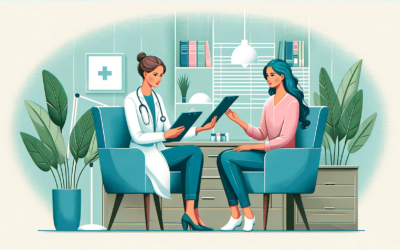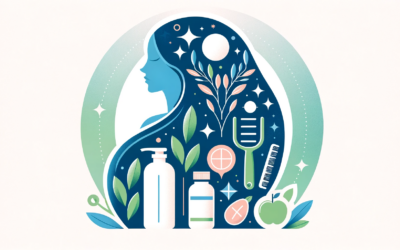The Effect of Diet on Hair Health and Hair Loss
I am passionate about sharing valuable insights into how diet and nutrition play a crucial role in maintaining healthy hair and preventing hair loss. It’s not just the products we use on our hair that matter; what we put into our bodies also significantly impacts our hair health. In this article, we’ll delve into the importance of proper nutrition and how nutritional deficiencies can lead to hair loss. I’ll also provide helpful suggestions on maintaining a diet that promotes healthy, luscious locks.
Importance of Nutrition for Hair Health
When it comes to maintaining strong and vibrant hair, the old adage “you are what you eat” couldn’t be truer. Our hair, like the rest of our body, relies on essential nutrients to thrive. The food we consume provides the building blocks necessary for hair growth and health.
A balanced diet is vital for maintaining the normal growth cycle of hair follicles. However, a deficiency in certain vitamins and minerals can disrupt this cycle, leading to hair thinning, breakage, and even hair loss. Understanding the impact of specific nutritional deficiencies can help us make informed choices about our diets and improve our hair’s overall health.
Key Nutrients for Healthy Hair
Several nutrients play key roles in maintaining healthy hair. These include protein, iron, vitamin C, omega-3 fatty acids, biotin, zinc, and vitamin D. Each nutrient contributes to different aspects of hair health, from providing strength and structure to promoting hair growth.
When we lack essential vitamins and minerals in our diet, our hair can suffer the consequences. For instance, a deficiency in iron can lead to anemia, which, in turn, affects the hair’s growth cycle. Similarly, inadequate levels of biotin can result in brittle and weak hair strands. Understanding these relationships can help us address deficiencies and promote healthier hair.
Role of Protein in Hair Structure
Protein is a fundamental component of hair, forming the very structure of each strand. It plays a crucial role in building and repairing tissues, including the hair follicles. Ensuring an adequate intake of protein helps maintain the strength and resilience of our hair.
Protein-rich foods such as lean meats, poultry, fish, eggs, beans, and lentils should be incorporated into our diets to support our hair’s protein needs. Vegetarians and vegans can opt for plant-based protein sources like tofu, tempeh, and quinoa.
Iron’s Role in Transporting Oxygen to Hair Follicles
Iron is essential for transporting oxygen to various parts of the body, including the hair follicles. Without adequate iron levels, the hair follicles may receive insufficient oxygen, leading to weakened hair and potential hair loss.
To maintain healthy iron levels, incorporate iron-rich foods into your diet. Some excellent sources include red meat, spinach, lentils, chickpeas, and fortified cereals.
Role of Vitamin C in Collagen Synthesis
Vitamin C is crucial for collagen production, a protein that supports the structure of hair and keeps it strong. Including vitamin C in your diet can aid in maintaining healthy hair.
Citrus fruits like oranges, lemons, and grapefruits are well-known sources of vitamin C. Additionally, strawberries, kiwis, and bell peppers are also rich in this essential nutrient.
Importance of Omega-3s for a Healthy Scalp
Omega-3 fatty acids have anti-inflammatory properties that benefit the scalp’s health. A healthy scalp environment is crucial for promoting hair growth.
To increase your omega-3 intake, consume fatty fish such as salmon, mackerel, and sardines. Plant-based sources include chia seeds, flaxseeds, and walnuts.
Biotin’s Role in Hair Growth and Thickness
Biotin, also known as Vitamin B7, is a water-soluble vitamin that supports hair growth and thickness. It contributes to the production of keratin, a protein that forms the structure of hair. Incorporate biotin-rich foods like eggs, nuts, seeds, sweet potatoes, and avocados into your diet to ensure adequate biotin levels.
Zinc’s Impact on Hair Follicle Health
Zinc plays a crucial role in the repair and growth of hair tissues. It aids in maintaining the oil-secreting glands around hair follicles, ensuring a healthy scalp.
To boost your zinc intake, consume foods such as oysters, beef, pumpkin seeds, and lentils.
Vitamin D’s Role in Hair Follicle Activation
Vitamin D is essential for maintaining hair follicle health and promoting hair growth. It helps activate hair follicles that may have become dormant. To increase vitamin D levels, spend time in sunlight or consider vitamin D supplements if necessary.
Combating Nutritional Deficiencies for Healthy Hair
A balanced and varied diet rich in the above-mentioned nutrients is the foundation for maintaining healthy hair. Focus on incorporating a wide range of nutrient-dense foods into your daily meals. In some cases, it may be challenging to obtain all the necessary nutrients solely through diet. In such instances, consider supplements after consulting with a healthcare professional.
Conclusion
In conclusion, maintaining proper nutrition is crucial for promoting healthy hair and preventing hair loss. A diet rich in protein, iron, vitamin C, omega-3 fatty acids, biotin, zinc, and vitamin D provides the essential elements our hair needs to thrive. By understanding the impact of nutritional deficiencies on hair health and making conscious dietary choices, we can enjoy luscious locks and boost our overall well-being.
Frequently Asked Questions?
Can nutritional deficiencies cause hair loss in women?
Yes, nutritional deficiencies can lead to hair loss in women by disrupting the hair growth cycle.
Can hair loss due to nutritional deficiencies be reversed?
In many cases, hair loss caused by nutritional deficiencies can be reversed by addressing the deficiencies through a balanced diet and supplements if needed.
How long does it take to see improvements in hair health after addressing nutritional deficiencies?
The timeline for improvements in hair health varies from person to person. It may take a few months to notice significant changes.
Are there any specific foods to avoid for healthy hair?
While a well-rounded diet is crucial, it’s essential to minimize the intake of processed foods, sugary snacks, and excessive alcohol consumption, as they can negatively affect hair health.
Can stress contribute to nutritional deficiencies and hair loss?
Yes, chronic stress can lead to poor dietary habits and potentially contribute to nutritional deficiencies, which may, in turn, result in hair loss. Managing stress is vital for overall health and hair well-being.






0 Comments